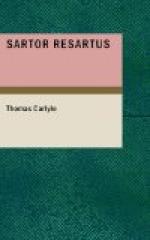Hofrath Heuschrecke, in a too long-winded Letter, full of compliments, Weissnichtwo politics, dinners, dining repartees, and other ephemeral trivialities, proceeds to remind us of what we knew well already: that however it may be with Metaphysics, and other abstract Science originating in the Head (Verstand) alone, no Life-Philosophy (Lebensphilosophie), such as this of Clothes pretends to be, which originates equally in the Character (Gemuth), and equally speaks thereto, can attain its significance till the Character itself is known and seen; “till the Author’s View of the World (Weltansicht), and how he actively and passively came by such view, are clear: in short till a Biography of him has been philosophico-poetically written, and philosophico-poetically read.... Nay,” adds he, “were the speculative scientific Truth even known, you still, in this inquiring age, ask yourself, Whence came it, and Why, and How?—and rest not, till, if no better may be, Fancy have shaped out an answer; and either in the authentic lineaments of Fact, or the forged ones of Fiction, a complete picture and Genetical History of the Man and his spiritual Endeavor lies before you. But why,” says the Hofrath, and indeed say we, “do I dilate on the uses of our Teufelsdrockh’s Biography? The great Herr Minister von Goethe has penetratingly remarked that Man is properly the only object that interests man:’ thus I too have noted, that in Weissnichtwo our whole conversation is little or nothing else but Biography or Autobiography; ever humano-anecdotical (menschlich-anekdotisch). Biography is by nature the most universally profitable, universally pleasant of all things: especially Biography of distinguished individuals.
“By this time, mein Verehrtester (my Most Esteemed),” continues he, with an eloquence which, unless the words be purloined from Teufelsdrockh, or some trick of his, as we suspect, is well-nigh unaccountable, “by this time you are fairly plunged (vertieft) in that mighty forest of Clothes-Philosophy; and looking round, as all readers do, with astonishment enough. Such portions and passages as you have already mastered, and brought to paper, could not but awaken a strange curiosity touching the mind they issued from; the perhaps unparalleled psychical mechanism, which manufactured such matter, and emitted it to the light of day. Had Teufelsdrockh also a father and mother; did he, at one time, wear drivel-bibs, and live on spoon-meat? Did he ever, in rapture and tears, clasp a friend’s bosom to his; looks he also wistfully into the long burial-aisle of the Past, where only winds, and their low harsh moan, give inarticulate answer? Has he fought duels;—good Heaven! how did he comport himself when in Love? By what singular stair-steps, in short, and subterranean passages, and sloughs of Despair, and steep Pisgah hills, has he reached this wonderful prophetic Hebron (a true Old-Clothes Jewry) where he now dwells?




